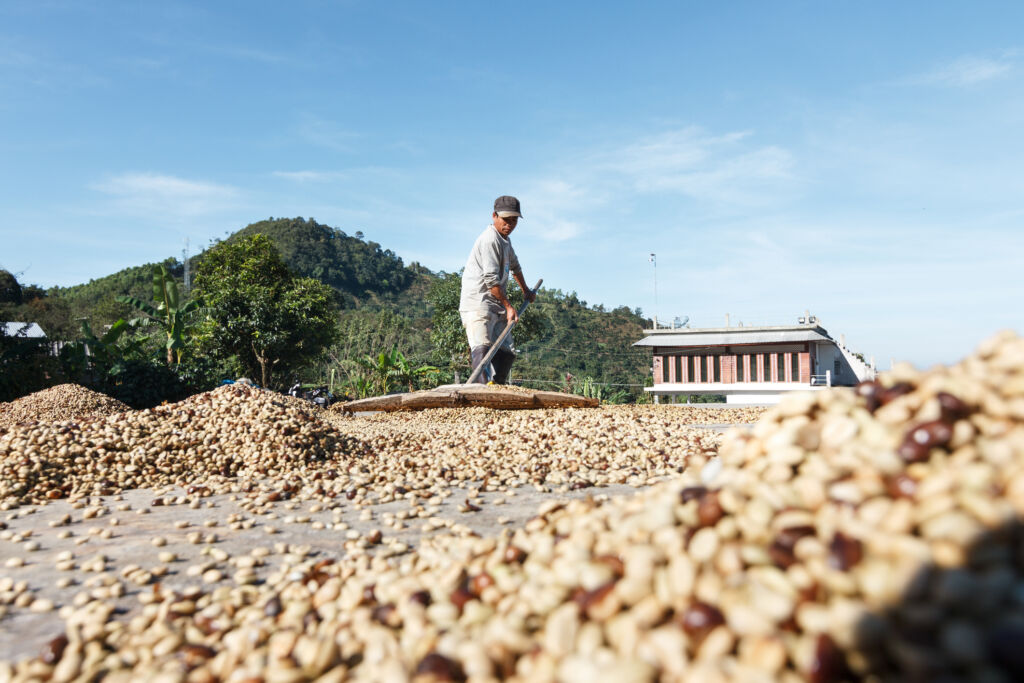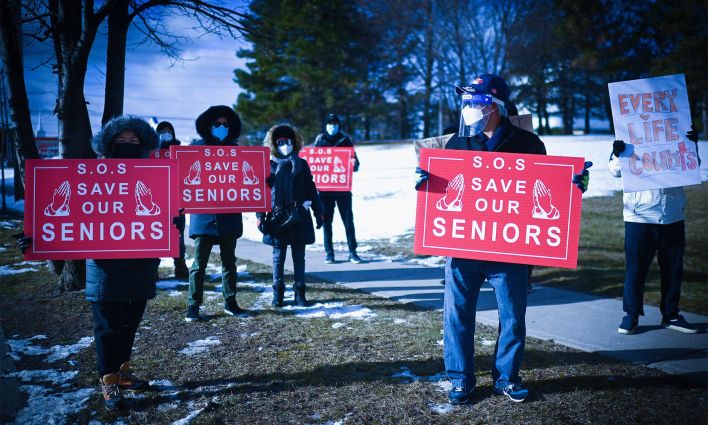Adapted from The Fair Trade Handbook: Building a Better World, Together, edited by Gavin Fridell, Zack Gross, and Sean McHugh, published by Fernwood Publishing
“The Fair Trade movement won’t be able to realize its vision only through a market-based approach. Shaping the rules of the game … and tackling imbalances of power in supply chains is essential to realize our movement’s vision, where justice and sustainable development are at the heart of trade structures and practices.” Sergi Corbalán
Over the past few decades free trade agreements have spread rapidly across the globe, entrenching the conditions under which goods, services and investments can flow with minimal friction and maximum profitability. While unprecedented wealth has been generated, its extreme concentration has led organizations like Oxfam, and even the International Monetary Fund (IMF), to identify the growing gap between the rich and poor as a major threat to global stability and prosperity. Free trade agreements have overwhelmingly favoured investor rights, with labour, human, gender, racial and environmental rights sidelined, ignored and trampled.
The rise of fair trade has been a response to these injustices. But, as Sergi Corbalán, Executive Director of the Fair Trade Advocacy Office (FTAO) in Brussels acknowledges above, the reach and impact of fair trade as a consumer-based movement remains limited. A challenge for fair traders is to create a vision for how the principles of fair trade — democracy, justice, dignity, human rights, a living income and environmental stewardship — can be used to inspire a new generation of trade agreements where human and planetary well-being are prioritized in the spirit of solidarity.
Certainly, the threat posed by climate breakdown warrants a multilateral agreement that is vested with these sorts of powers, or those held by global financial institutions... In practice, no such agreement exists for the environment.
A multilateral world order?
A starting point for building a fair trade agreement could be to look at existing multilateral institutions that deal with everything from trade and investment rules to issues of global poverty, sustainability, public health, human rights and climate change. These institutions have vastly different degrees of influence and effectiveness, often depending on the extent to which their goals align with those of powerful countries and corporations. As a result, issues of social and ecological justice are rarely prioritized or enforced.
The 2015 Paris Climate Agreement illustrates this point. Climate breakdown represents one of the gravest threats to humanity, and it demands bold and decisive action. Ratified by 189 countries, the Paris Agreement emerged from years of difficult negotiations led by the United Nations Framework Convention on Climate Change (UNFCCC). The agreement represents the main multilateral framework for globally organizing state action on climate breakdown, and yet, it does not have the status of an official treaty and lacks any legally binding emission reduction or financial commitments. The voluntary commitments made through the agreement, moreover, have been widely assessed as inadequate to avoid catastrophic climate change. The Climate Action Tracker projects possible warming of over 3°C under current commitments, significantly higher than the agreement’s target to limit warming above pre-industrial levels to well below 2°C.
In contrast, the World Trade Organization (WTO), the world’s top intergovernmental trade body, has enforceable trade liberalization rules with legally binding commitments, a Dispute Settlement Body to handle violations and a range of penalties carrying political and economic weight. Certainly, the threat posed by climate breakdown warrants a multilateral agreement that is vested with these sorts of powers, or those held by global financial institutions like the IMF and World Bank, which regularly make decisions impacting the global economy and the livelihoods of millions. In practice, no such agreement exists for the environment.
Certain examples do demonstrate that multilateral action among states can be harnessed to support fairer outcomes. In the post–World War II era, a range of projects emerged that supported fairer prices and incomes for small farmers and rural workers. This included the International Coffee Agreement (ICA), lasting from the 1960s to the 1980s. Through a quota system that regulated higher and more stable coffee prices, from 1976 to 1989, millions of farmers worldwide received prices that would today be considered equivalent to the minimum price guaranteed by Fairtrade standards.
In another case, beginning in 2004 a group of ten Latin American and Caribbean countries formed the Bolivarian Alliance for the Peoples of Our America (ALBA) as an alternative to free trade agreements, emphasizing collaboration, cooperation and recognition of the asymmetries of size and power between different partners. This initiative has trained doctors, engaged in healthcare internationalism, provided extensive literacy programs, subsidized petroleum for lower income members and provided low-cost financing to partners in need.
In one case, the Caribbean nation of St. Vincent and the Grenadines, one of the smallest nations in the world, was able to construct a vital international airport during a time of economic downturn, with support from ALBA partners Cuba and Venezuela. This included low-interest loans and millions of dollars of unique, in-kind assistance, including free engineering services, construction equipment, wind stations and an on-site laboratory—equivalent to nearly 40% of the airport cost. Completed in 2017, the airport is a critical source of global connectivity for this small island state. At the same time, ALBA has had its challenges, including an over-reliance on oil exports to fund its projects. This has resulted in a decline in initiatives during the economic downturn, when the price for oil and other commodities has dropped significantly.
While positive examples of multilateral cooperation exist, the norm in global politics is to show little interest in social and ecological justice. Some international law experts argue that multilateral negotiations offer an opportunity for smaller or more marginalized nations to bind together and make collective demands on more powerful ones. The work of the Alliance of Small Island States in securing broad diplomatic support to include an aspirational limit of 1.5°C of warming above pre-industrial levels in the Paris Agreement, is a case in point. However, when measured against the actual emission reduction commitments made by governments, and the lack of legal force around them, these successes appear mostly symbolic. All too often, multilateral forums are perceived as places where progressive agendas go to die, hindered by opposition or disinterest from powerful states who prioritize their perceived national interests over those of the common good.
According to a 2017 UNCTAD analysis on Investor-State Dispute Settlement, from 1987-2017, a total of 855 investor disputes were launched against states, awarding billions of dollars to corporations, with the average award amounting to $125 million.
Going it alone: The unilateral option
Frustrated with the pace of things at the multilateral level, unions, social justice organizations and human rights groups have often lobbied for unilateral action from their own national governments. Generalized systems of preferences (GSPs) are one example. Used in particular by the United States and the European Union (EU), GSPs allow developing and least developed countries to gain preferential access to Northern markets in return for fulfilling obligations with respect to labour rights, human rights and sustainable development. While some gains have been documented, GSPs are often criticized as unilateral, paternalistic impositions on Southern nations, in a manner that can hamper their economic competitiveness without providing genuine partnership, mutual dialogue or shared responsibility for the costs associated with improved standards (higher wages, technical training, expanded labour inspections).
To avoid some of these concerns, social justice groups have placed increased efforts on pushing their own governments to adopt policies that demand accountability from their domestic-based transnational companies for the negative impacts along their global supply chains. Modern slavery legislation has been particularly notable in and widely adopted by countries such as the United Kingdom, France, the Netherlands, Norway and Australia. In Canada, a coalition of groups led by World Vision, Fairtrade Canada, UNICEF Canada and Save the Children successfully lobbied the government to table legislation for a Modern Slavery Act in 2020.
According to the ILO, in 2016, modern slavery affected 40 million victims, people unable to refuse work due to threats, violence, coercion, deception or abuse of power. Modern slavery legislation requires large corporations to report steps they have taken to ensure there is no forced labour in their supply chains. While this legislation has been a welcome victory for human rights advocates, a great deal remains to be done. In the United Kingdom, corporations must report the steps they have taken, yet the legislation has not required much more than this; it even allows corporations to simply state that “no such steps” have been taken. The legislation in Canada, if it receives final approval, as well as new legislation in the works globally, could go beyond this by directly prohibiting the importation of goods produced by forced or child labour.
Riding on free trade agreements: From sidelines to main game?
Efforts to include social rights chapters in trade agreements have been among the most prominent options over the past few years. These agreements have long contained extensive regulations on everything from investment rights, intellectual property rights and rules of origin to public procurement and state enterprises. As passionate free trade proponent economist Jagdish Bhagwati argues in Termites in the Trading System, under the cover of being “trade-related,” these agreements have expanded vastly to include a wide range of rules that have “nothing to do with the freeing of trade.”
Not only do these agreements extend beyond freeing trade, but they are also heavily slanted in favour of corporate interests. Investment rights chapters, for instance, have clear and binding rules, penalties for violations, and dispute panels that can be launched unilaterally by transnational corporations. As a result, they have been used extensively. According to a 2017 United Nations Conference on Trade and Development (UNCTAD) analysis on Investor-State Dispute Settlement, from 1987 to 2017, a total of 855 investor disputes were launched against states, awarding billions of dollars to corporations, with the average award amounting to $125 million.
Labour chapters, in contrast, when they exist at all, contain general language and significant barriers to enforcement. As a result, only one major labour case has ever been brought before a trade tribunal, through the Dominican Republic-Central America Free Trade Agreement (CAFTA-DR) with the United States. In this case, the tribunal infamously determined in 2017 that the Guatemalan government had violated labour laws at eight separate workplaces, but that the actions did not “affect trade,” so the case was dismissed.
Can this bias in trade agreements be shifted? A range of groups, in particular unions, as well as policy makers, academics and some governments have offered proposals with this in mind, advocating for new trade chapters, as opposed to the side agreements that have been the norm historically, on labour, gender equality, the environment, Indigenous rights and human rights. While many of the best ideas remain on paper, some important gains have emerged in trade negotiations at the bilateral and plurilateral level.
Perhaps most important has been an expansion of trade agreements with labour chapters that might have enforceable mechanisms. This includes the renegotiated NAFTA, which, in 2020, became the new Canada-United States-Mexico Agreement (CUSMA), with a labour rights chapter that goes beyond previous models, including stronger labour standards, a more direct path to dispute panels and a new “rapid-response” enforcement mechanism with the power to investigate labour violations and impose penalties. The inclusion of this chapter builds upon years of tri-national union lobbying, which, according to Angelo Di Caro, National Representative of Unifor, Canada’s largest private sector union, aimed at “a very ambitious approach to reforming how labour standards are addressed in free trade agreements.” In a recent interview, Di Caro said, “I think what they have proposed in NAFTA really does break the mold in terms of what we’ve seen in other free trade accords.”
Other new social rights chapters, while offering some promise, appear to lack genuine enforceability and could end up like the empty chapters of the past. The CUSMA’s environment chapter, Chapter 24, while technically enforceable, fails to directly mention climate change and contains key loopholes that suggest it is unlikely to be rigorously enforced. For instance, while any group can raise a complaint if they think a country has failed to follow its own environmental laws, the complaint “may” be considered by an environmental commission if it meets various criteria, including that it “appears to be aimed at promoting enforcement rather than at harassing industry.”
In other agreements, the government of Canada under Prime Minister Justin Trudeau has been keen to promote new gender chapters as part of its “progressive” trade agenda. This has led to new gender additions to the pre-existing Canada-Chile Free Trade Agreement (CCFTA) in 2017 and the Canada-Israel Free Trade Agreement (CIFTA) in 2018. Only the Canada-Israel chapter is, in theory, subject to enforcement and dispute resolution. In both cases, however, the language is vague, offering general commitments to promote gender-responsive policies and foster financial inclusion, leadership, entrepreneurship and capacity building for women. It is difficult to imagine how these commitments could be meaningfully enforced or transcend the general pledges typically made by governments.
They also run the risk of perpetuating and promoting free trade agreements without regard for their negative impacts that disproportionately affect women, such as cuts to public spending, increasing costs for medicine, or the feminization of low-paid precarious work (Bissio 2017).
One of the benefits of the VPA vision is that it shifts away from unilateral imposition toward partnership, shared responsibility and mutual benefits, with both countries negotiating an agreement designed to meet their needs.
A Fair Trade Vision for Bilateral Agreements?
One of the more interesting models to emerge in recent years is that of Voluntary Partnership Agreements (VPAs), which advance a vision for bilateral agreements that are not about free trade, per se, but rather about achieving specific social and ecological goals among trading partners. According to Sergi Corbalán, of the FTAO, VPAs offer an opportunity to imagine what fair trade agreements could look like. To this end, the FTAO has worked in partnership with sustainable forestry groups to advocate for VPAs modelled off those that exist between the EU and timber-exporting countries.
Under the terms of the EU’s Forest Law Enforcement, Governance and Trade (FLEGT) Action Plan, initiated in 2003, a series of VPAs have been adopted between the EU and its timber suppliers where the latter gain easier access to the EU market in exchange for demonstrating that the timber has been legally, and more sustainably produced. As the VPA is a “partnership,” the EU has stepped up to provide capacity-building to assist timber exporters in setting up licensing schemes and improving enforcement.
Despite slow progress at the start, as of 2019, the EU had VPAs with nine countries, and several more in the works. Duncan Brack, in his report Towards Sustainable Cocoa Supply Chains: Regulatory Options for the EU, concludes that the VPAs have “in some cases significantly improved governance and law enforcement, making the forest sector more transparent and accountable, and reducing illegal logging.” At the same time, FLEGT has been criticized for its role in criminalizing and negatively impacting small timber suppliers that lack secure land tenure (Rutta, Myers, Ramcilovic-Suominen and McDermott 2018).
The FTAO and its partners believe the concept of a VPA could be applied to other products, like cocoa, which is a major driver of deforestation in West Africa, while its shortcomings could be addressed through a wider mandate aimed at the needs of smallholders and workers through fair trade standards. This could be combined with other existing and proposed EU policies, such as sustainable procurement, supply chain legislation and corporate due diligence laws, for maximum impact.
Moving the discussion away from the EU, Canada could explore similar models, with fair trade and ecological justice as the key objectives. One of the benefits of the VPA vision is that it shifts away from unilateral imposition toward partnership, shared responsibility and mutual benefits, with both countries negotiating an agreement designed to meet their needs. It also lifts things out of the sometimes-amorphous world of global agreements, where grand statements and general commitments are often made without clear, direct objectives and a precise way to measure real impacts.
Imagine, for instance, a VPA for coffee between Canada and its major coffee-exporting partners. While coffee is a globalized industry, Canada imports nearly 68% of its unprocessed coffee beans from just Brazil, Colombia and Guatemala. Starting with Guatemala, the most economically vulnerable of the three, Canada could negotiate a coffee VPA aimed at assisting coffee farmers in addressing the impact of climate change, which threatens the entire region due to unpredictable weather patterns, warmer climate and increased vulnerability to coffee disease and pests, while also achieving fair trade standards for farmers and workers. The initial VPA could be reproduced to include other coffee exporters and provide a clear mechanism for multi-stakeholder engagement between governments, farmer representatives, unions, nongovernmental organizations and industry.
Fair trade could be scaled up to the level of intergovernmental relations through a model aimed at avoiding the paternalist impositions of the past.
Stepping up fair trade
The COVID-19 pandemic shines a light on the profound dangers of an international economic system whose rules are designed to safeguard investor and business profitability and, in doing so, diminish the capacity of far too many, including the world’s most vulnerable, to withstand the crisis. While fair trade advocates have highlighted this fact for decades, grinding poverty remains a daily reality for an unacceptably high number of the world’s small producers. A major challenge, both politically and economically, is to imagine how fair trade principles might serve as a starting point to reimagine trade as a tool for achieving human and planetary well-being.
While this chapter’s overview of specific examples showcases their promises and limitations, it also shows that there is no silver bullet for making trade truly fair. As activists, practitioners, scholars, consumers and policy makers, the task ahead demands of us an honest naming of the injustices that mark the contemporary free trade regime, an openness to learn the lessons from existing initiatives and a willingness to refuse business-as-usual.
Recommended resources
Bissio, Roberto. 2017. Is ‘gender’ a Trojan horse to introduce new issues at WTO? Third World Network.
Brack, Duncan 2019. Towards Sustainable Cocoa Supply Chains: Regulatory Options for the EU. Fern, Tropenbos International, Fair Trade Advocacy Offices
Canadian Foreign Policy Institute.
Center for Studies on Integration and Globalization (CEIM), Towards a Socially Responsible Trade Policy.
Rutta, Rebecca, Rodd Myers, Sabaheta Ramcilovic-Suominen, and Constance McDermott. 2018. “FLEGT: Another ‘Forestry Fad’?” Environmental Science and Policy 89.
Sinclair, Scott, Manuel Pérez-Rocha, and Ethan Earle (eds.). 2019. Beyond NAFTA 2.0: A Trade Agenda for People and Planet. Canadian Centre for Policy Alternatives (CCPA), Institute for Policy Studies (IPS), the Rosa Luxemburg Foundation.
The Fair Trade Handbook is published by Fernwood Publishing. It is available for preorder on their website now and will be in stores on October 1, 2021. The Monitor thanks the authors for sharing this preview with us.










